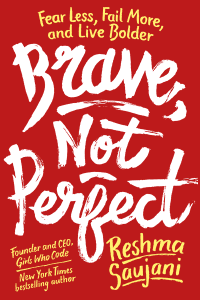From startups to restaurants to high-tech corporations, women are taking the business world by storm and leaving their mark. Here, Girls Who Code founder Reshma Saujani talks about training a new generation of girls to be brave rather than perfect.
Back in 2010, when social media and automation started on its soaring trajectory, Reshma Saujani, already an accomplished lawyer and politician, set her sights on the technology sector. Having never written a line of code herself, in 2012 she founded Girls Who Code, a non-profit aimed at achieving gender parity in the burgeoning business. Offering free workshops and after-school programs, the company has since bloomed into a sisterhood of sorts, one that elevates young women from coding courses to college and beyond, all in the hopes of making a piece of the booming tech industry more in reach. “My passion around this issue is making sure girls have that same chance to jump up into the middle class,” she says.
Now, Girls Who Code is poised to spur a real revolution. By the end of the year, the company will have reached 185,000 students with business expansions into Canada, the United Kingdom, and India. “We really feel like we can close the gender gap in the next 10-15 years, both domestically and internationally,” says Saujani.
It’s no small task, but she’s ready to take on the challenge. Here, Saujani poses her insights into a new dawn of women taking on the tech sector.
From your perspective, how has our culture stunted women’s abilities to thrive in the STEM community and reach senior leadership positions within?
Our culture has portrayed technology and computer science to be a guy thing. We’ve told girls this is not for you, and they’re listening. We also raise our girls to be perfect, so when something is hard for them or doesn’t come immediately, which is often the case for math and science, they think, I’m not good at it, I’m not smart. And because they get addicted to perfectionism, they start giving up before they even try. We do that as women, too—we constantly credentialize ourselves. We have to dim that voice in our heads that tells us we’re not smart enough, that we have to be perfect to lead.
What are some ways women can escape that negative voice?
Practice imperfection. I tell women to send a consequential email with a typo in it. Think about how much time you spend rewriting and reading your emails, putting in the perfect amount of emojis and exclamation points—you don’t get to what you want to say. You could be spending time doing something else. So, practice imperfection, whatever that means to you. The next thing is doing something you suck at, not for the sake of getting better at it, but for feeling what it’s like to just enjoy something you like even if you’re mediocre. The third thing is just start. All of us have something we want to do: starting a company or a podcast, looking at a messy closet, cooking a dish that we’ve been dying to try. Just take one step.
Which of your peers really embody this mentality?
Someone who I really admire right now is Stacey Abrams who ran for governor in Georgia and lost. The next day she just kept going. For too long we’ve had women role models who were failing and then just went away. Even hearing Michelle Obama talk about her IVF struggles and the fact that [her and Barack] were in couples counselling, and just being real and authentic, to me was just so awe-inspiring.
How do we bring men into this conversation of supporting women?
I think men are critical to the bravery movement. And so if you’re a dad, stop protecting your daughter—let her get real messy and dirty. Let her just be. If the toilet is broken, grab her to go fix it. If you’re a colleague or a partner or a best friend, encourage her to be brave. Sometimes it means not saying anything. In meetings, men will speak 75 percent of the time. Just be quiet; create space for other women to be courageous.

In her new book, Brave, Not Perfect, Saujani cuts deep into the ways we get caught up in the “myth of perfection”, and offers real-life solutions for turning bravery into joy. Here are three takeaways you can start using now.
Ask for What You Want
Start small by making it a daily habit to ask for one thing that’s a little bit outside your comfort zone…Don’t automatically offer an out. I can’t tell you how often employees will ask me for something and then immediately backpedal by saying, “But if it’s not possible, that’s okay.” Just ask and then be quiet; let the person answer for themselves.
Just Say No
I’ve learned to look at saying no as a value calculation. I ask myself: What are the things that are the highest value for me? What aligns with my purpose? This helps me find the line between supporting others but not to my own detriment.
Invite Criticism
It’s kind of like radical exposure therapy to desensitize yourself…The more you do this, the easier it gets, and the faster you’ll go from feeling kicked in the gut by criticism to feeling grateful and empowered by it.








